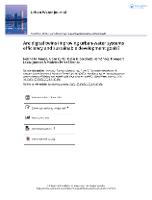Are digital twins improving urban-water systems efficiency and sustainable development goals?
Date
2023Author
Ramos, Helena M.
Kuriqi, Alban
Coronado-Hernández, Oscar E.
López-Jiménez, P. Amparo
Pérez-Sánchez, Modesto
Metadata
Show full item recordAbstract
The use of these new interaction tool implies the improvement of the awareness of the whole system and it lies in improving the sustainability and efficiency of the water systems with the integration of measurements. The research proposed a methodology, which enables improvement in the accuracy and reliability of data and it increases the performance of water systems. This study proposes a pressure-reduction strategy and the implementation of pumps as turbines (PATs), applicable in Sta Cruz, Madeira water system. The use of the developed digital twin model assures a decrease of 3.3 hm3 in water-demand volume, increasing renewable generation by micro-hydropower up to 1.2 GWh. These actions would result in savings above 1.5 M€, decreasing around 530 tons of CO2 emissions each year. The consideration of these values implies the improvement of different indicators, which allows the evaluation of different targets linked to sustainable development goals (SDGs). A digital twin is a tool, which enables a real-time simulation of the water systems and therefore, the water managers can make a decision in the management of the water system over time. The use of these new interaction tool implies the improvement of the awareness of the whole system and it lies in improving the sustainability and efficiency of the water systems with the integration of measurements. The research proposed a methodology to integrate GIS and water models, being the main goal the integration of social, economic, environmental and technical issues. This integration enables improvement in the accuracy and reliability of data and it increases the performance of water systems. This study proposes a pressure-reduction strategy and the implementation of pumps as turbines (PATs), applicable in Sta Cruz, Madeira water system. The use of the developed digital twin model assures a decrease of 3.3 hm3 in water-demand volume, increasing renewable generation by micro-hydropower up to 1.2 GWh. These actions would result in savings above 1.5 M€, decreasing around 530 tons of CO2 emissions each year. The consideration of these values implies the improvement of different indicators, which allows the evaluation of different targets linked to sustainable development goals (SDGs). © 2023 Informa UK Limited, trading as Taylor & Francis Group.
Citar como
Ramos, H. M., Kuriqi, A., Coronado-Hernández, O. E., López-Jiménez, P. A., & Pérez-Sánchez, M. (2023). Are digital twins improving urban-water systems efficiency and sustainable development goals? Urban Water Journal, 1–13. https://doi.org/10.1080/1573062x.2023.2180396Collections
- Productos de investigación [1453]
Compatible para recolección con:

Archivos
The following license files are associated with this item:
Universidad Tecnológica de Bolívar - 2017 Institución de Educación Superior sujeta a inspección y vigilancia por el Ministerio de Educación Nacional. Resolución No 961 del 26 de octubre de 1970 a través de la cual la Gobernación de Bolívar otorga la Personería Jurídica a la Universidad Tecnológica de Bolívar.













